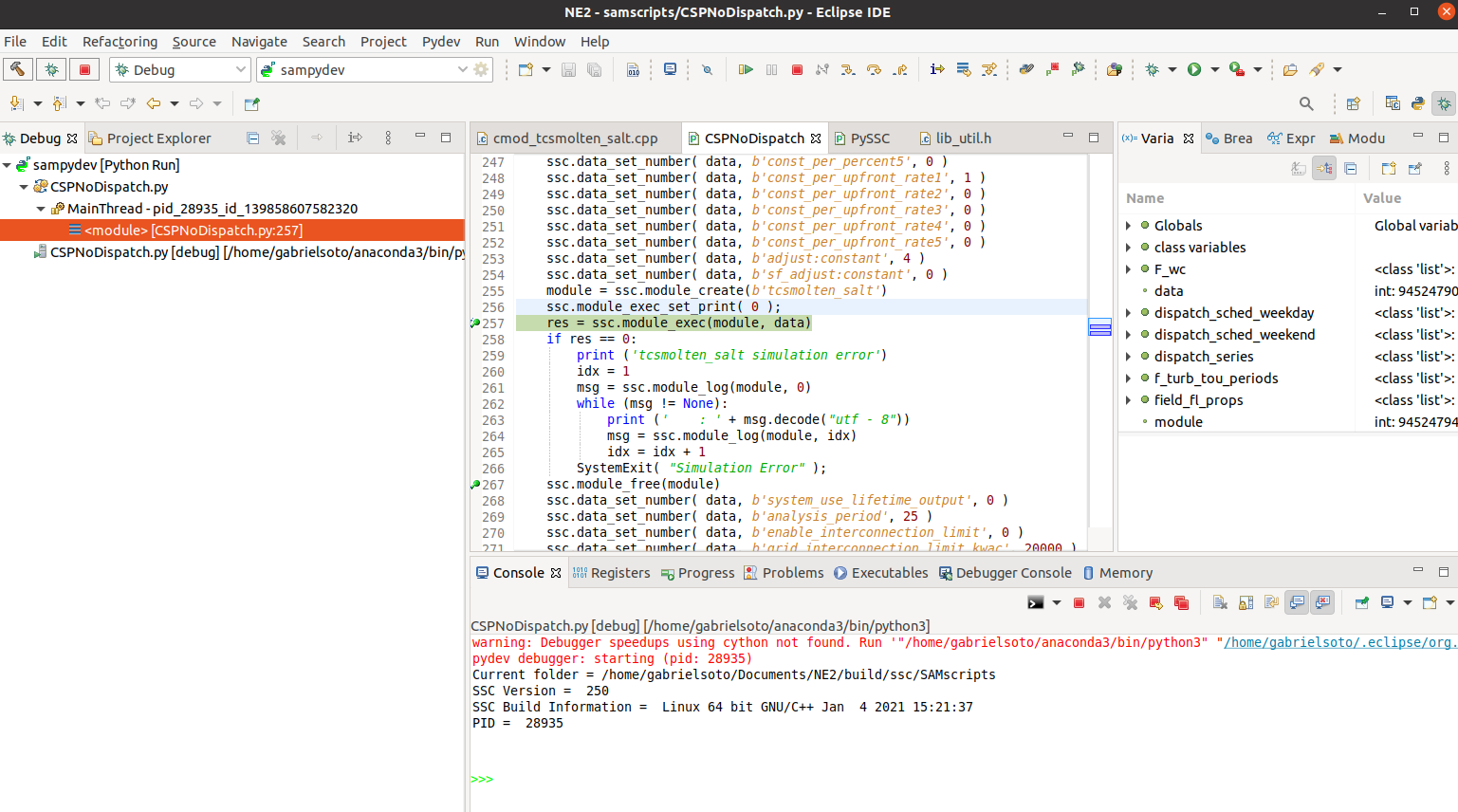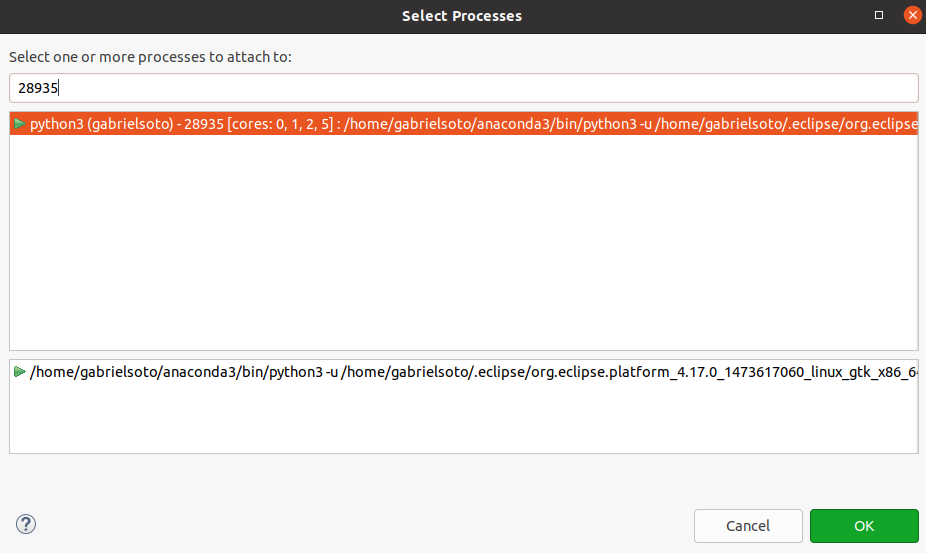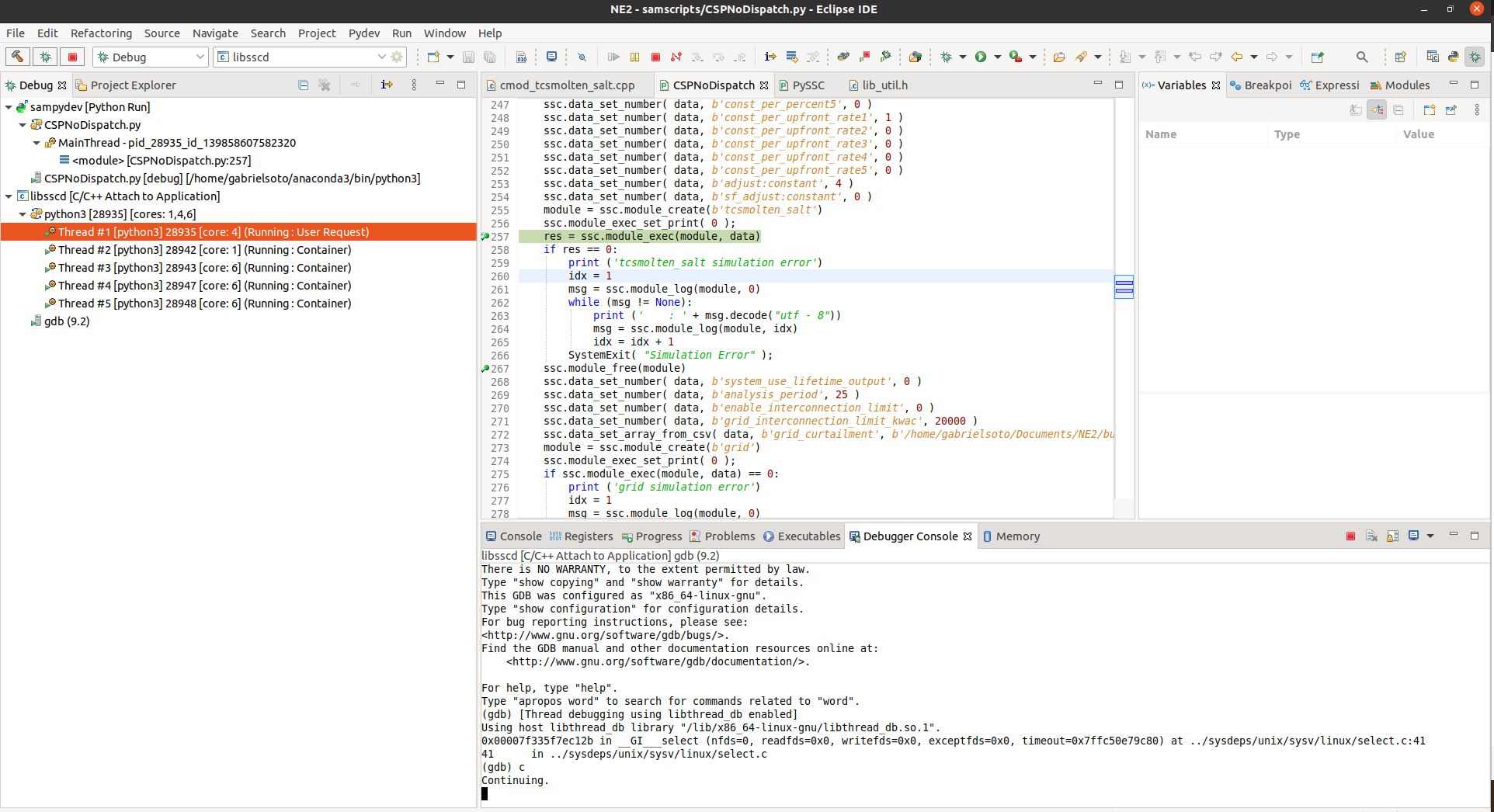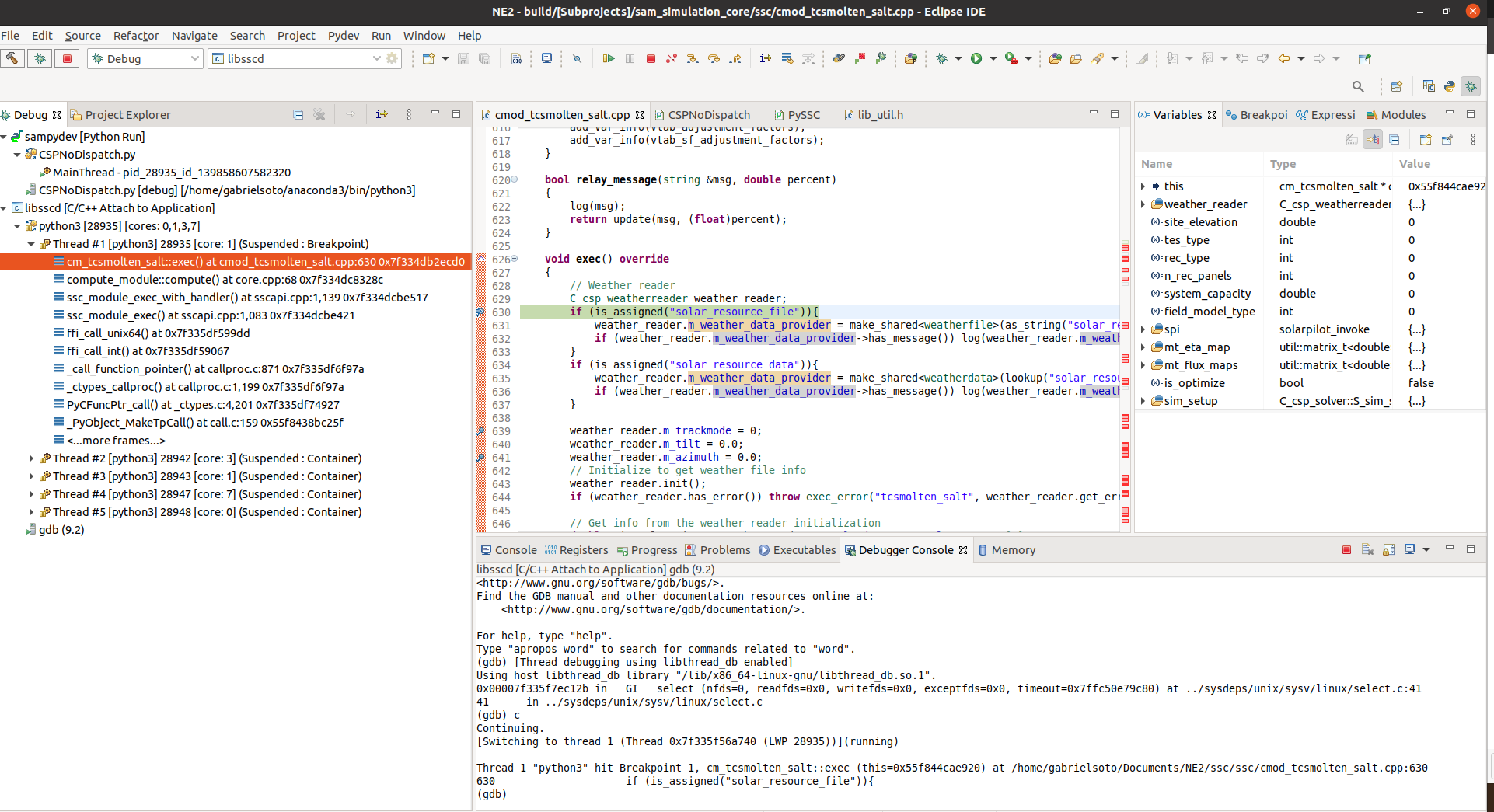-
Notifications
You must be signed in to change notification settings - Fork 84
Debug SSC with PySSC Linux EclipseIDE
So far I have only gotten the mixed-mode debugging working on the Eclipse IDE. In this case, it involves running a Python script that calls a C++ shared object/dynamic library file (such as libsscd.so) and, after setting a breakpoint in an appropriate .cpp file, having the IDE catch the breakpoint and allow C++ debugging. You can download the Eclipse IDE at the official site.
First, follow the build instructions for Linux found through this link. Ultimately, there will be separate directories for LK, WEX, SSC, and SAM. These will be housed in a parent directory, which is referred to as sam_dev. Some additional comments on the Linux instructions:
-
Make sure you always build the Debug version of things
-
2.4 : the complete path I used was
../sam_dev/wxWidgets-3.1.1/lib/wx-3.1.1 -
3.0 : After entering the
cmakecommand in the terminal forgoogletest, runmake -j4Afterwards, I found four gtest library files under
../sam_dev/googletest/build/lib. If you built the Debug version, they should look likelibgtest<d>.a(without<and>). I copied and pasted all four files into../sam_dev/googletestand../sam_dev/googletest/googletest. This seemed to have fixed some linker errors when building the gtest files inSSClater. -
5.1 In this step, create the build folder as
../sam_dev/build. Make sure you have the CMakeLists.txt set up for bundling the four projects as a single project. Then, runcmakefor the specific generator for the Eclipse IDE:mkdir buildcd buildcmake -G "Eclipse CDT4 - Unix Makefiles" -DCMAKE_BUILD_TYPE:STRING=Debug -DCMAKE_SYSTEM_VERSION=10.0 ..make -j4An optional flag to use in the third line above would be
-DSAM_SKIP_TESTS=trueif having trouble with thegtestlinker errors.
After following all the Linux build steps, there will be separate folders for each individual project under the ../sam_dev/build directory. Most important are the ssc and sam folders. Some notes before moving on:
-
Within the
../sam_dev/build/samfolder there will be a binary version of the SAM Desktop that will be used to auto-generatepython3scripts using PySSC. -
Within the
../sam_dev/build/sscfolder there will be anssclibrary calledlibssc<d>.so(the Debug version, without the<and>). Thepython3scripts will manually be changed to call this file. -
Within the parent directory
../sam_devthere will be a.cprojectand.projectfile, used as the workspace for the Eclipse IDE.
Once sam is successfully built, we want to run it to auto-generate PySSC scripts. However, a bash script wasn't automatically generated to run SAM in my case (if it was created on your system, feel free to skip to the next step).
-
Make sure the
SAMbinary file is located at the following address (noting that this is a Debug version):../sam_dev/build/sam/deploy/linux_64/SAM<d>.bin -
Open a new terminal in the build directory:
../sam_dev/build -
Create an empty bash script (feel free to name it however is most convenient) and open it in a text editor as follows:
cd samtouch sam_bashgedit sam_bash -
In the file, add:
#!/bin/shcd <path_to_sam_dev>/build/sam/deployexport LD_LIBRARY_PATH=$LD_LIBRARY_PATH:<path_to_sam_dev>/build/sam/deploy/linux_64exec <path_to_sam_dev>/build/sam/deploy/linux_64/SAMd.binSave and close the file. For disambiguation, the full path I
cd'd into on the second line was/home/gabrielsoto/Documents/sam_dev/build/sam/deploy(I also callsam_devsomething else in my file system).Note I am missing something in the bash script that calls GTKTheme as follows:
export GTK2_RC_FILES=<path_to_sam_dev>/build/sam/deploy/linux_64/GtkTheme/gtk-2.0/gtkrc**It doesn't affect the ability to run
SAMbut still worth noting. TheGtkThemesubfolder was not created upon finishing the build. -
Add the proper permissions to run the bash script and open SAM Desktop:
chmod +x sam_bash./sam_bash
In SAM Desktop,
-
Select Start a new project > Concentrating Solar Power > Power Tower Molten Salt > Power Purchase Agreement > Single Owner
In the top toolbar, there should be an untitled project tab.
-
(Optional) In the drop down menu of the untitled tab, select Rename to rename the project.
-
In the drop down menu of the project, select Generate Code > Python 3.
-
Choose a folder to place the generated scripts, weather files, etc. I put them in the following directory
../sam_dev/build/ssc/samscriptsthough the naming and location are probably unimportant.
There should be two
.pyfiles in this folder: one named after the project and one namedPySSC.py. The former contains the main code. -
Open both files in either a text editor or Python IDE.
-
In the
<project_name>.pyfile, make the following changes:-
add
import osbefore declaring the main code. -
add the following code to display the process ID (used later to attach Python process to C++ actions)
pid = os.getpid()print('PID = '.pid) -
make sure all resource files have the correct address
-
-
In the
PySSC.pyfile, make the following changes:-
remove all the
if-elsestatements and change theself.pdlldeclaration to the following code, remembering to change the<path_to_sam_dev>portion to the correct address:def __init__(self):`self.pdll = CDLL('<path_to_sam_dev>/build/ssc/ssc/libsscd.so')` -
change all calls to a
doublefunction tofloat(the former doesn't exist in Python)
-
The Eclipse IDE can be used to run/debug both Python scripts and C++ files.
-
Open the Eclipse desktop app.
-
In the Eclipse IDE Launcher, select
<path_to_sam_dev>as the workspace directory and click Launch. -
Enable/install PyDev to run and debug Python scripts
-
Go to Help > Install New Software
-
Under Work with, enter:
https://pydev.org/updates -
Select PyDev and finish the installation
-
-
Change the preferences of Eclipse+PyDev to run the correct Python interpreter
-
Go to Window > Preferences > PyDev > Interpreters > Python Interpreters
-
Select Browse for python/pypy exe
-
Find the location of your Python installation (for reference, I downloaded mine through Anaconda and is located at
/home/gabrielsoto/anaconda3/bin/python3
-
-
Open the C++ build folder in the Project Explorer window. Do this through File > Open Projects from File System
-
Next to Import Source, click Directory and select
<path_to_sam_dev>/build -
In the window underneath, make sure
buildis selected and click Finish -
The
buildfolder should now appear in the Project Explorer window
-
-
Create a separate Python project to run the
PySSCscripts-
Go to File > New > Project > PyDev > PyDev Project and click Next
-
Name the project (e.g.,
samscripts) -
Under Directory select the path to the generated Python3 scripts from Step 3
-
Choose project type as Python
-
Choose interpreter as the one selected in Step 4.4
-
Select Add project directory to the PYTHONPATH and click Finish
-
The
samscriptsfolder should now appear in the Project Explorer window
-
-
Create a Python Debug configuration
-
Go to Run > Debug Configuration
-
Right-click Python Run and select New Configuration
-
Name the configuration (e.g.,
sampydev) -
Select the Python project
samscriptscreated in Step 4.6 -
Under Main Module select the
<project_name>.pyfile and click Apply
-
-
Create a C++ Debug configuration
-
Go to Run > Debug Configuration
-
Right-click C/C++ Attach to Application and select New Configuration
-
Name the configuration (e.g.,
libsscd) -
Select the C++ project
buildcreated in Step 4.5 -
Under C/C++ Application select the shared object file found at
ssc/ssc/libsscd.so(under the parent directory<path_to_sam_dev>/build) -
Under the Debugger tab, select
gdbas the debugger
-
With Eclipse properly set up, we can now run and debug Python scripts that called the libsscd.so share object file.
-
There might be some permissions problems when using "Attach to Process." In an open terminal, enter
echo 0 | sudo tee /proc/sys/kernel/yama/ptrace_scopeto temporarily grant permissions. You can permanently fix this by changing the contents of that file, but that scares me.
-
Open the
<project_name>.pyfile and set a breakpoint around Line 257, wheressc.module_exec(module,data)is called -
Open the appropriate
cmodC++ file. In this particular case it is thecmod_tcsmolten_salt.cppfile-
The correct file is found at
build>ssc>ssc>libsscd.so>cmod_tcsmolten_salt.cpp -
Set a breakpoint after Line 626, in the scope of
void exec( ) override { }
-
-
Begin Python debugging session
-
Go to Run > Debug Configuration > Python Run > sampydev and click Debug
-
sampydevshould show up in the Debug window -
The breakpoint in the
<project_name>.pyfile should catch, pausing in the Console tab as shown (note the printed PID)

-
-
Begin C++ debugging session
-
Go to Run > Debug Configuration > C/C++ Attach to Application > libsscd and click Debug
-
An Attach to Process window should pop up. Enter the Python PID noted previously and click OK

-
libsscdshould show up in the Debug window, withpython3andgdbtabs. Highlight the Thread underpython3tab that reads "Running: User Request" -
Switch from Console to Debugger Console below, where there should be a
(gdb)line waiting for input. Enter 'c' (for 'continue')

-
Highlight
<module>[<project_name>]underneath thesampydevrun in the Debug window and pressF8to continue the debugging session -
The breakpoint in
cmod_tcsmolten_salt.cppfile should catch. Happy debugging!

-